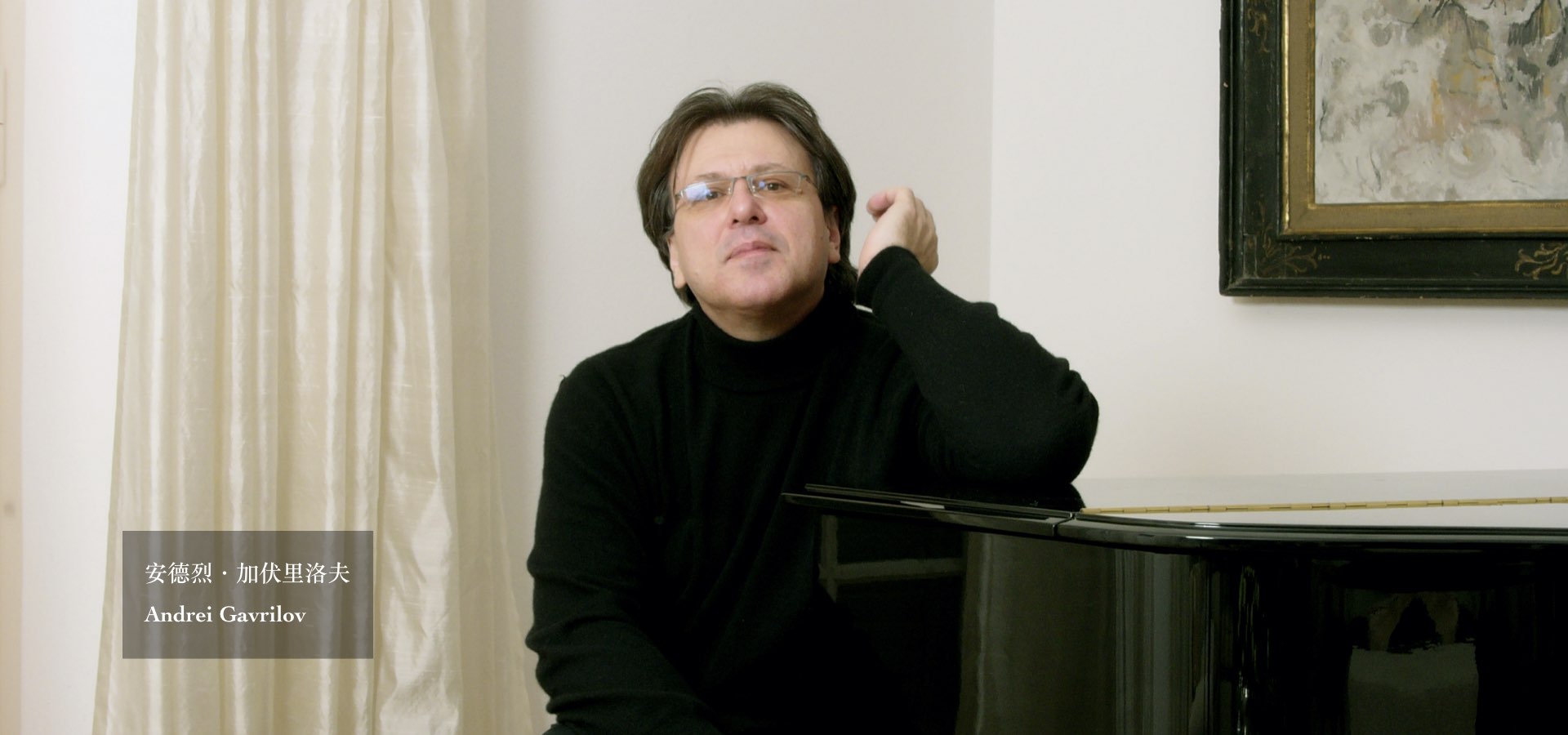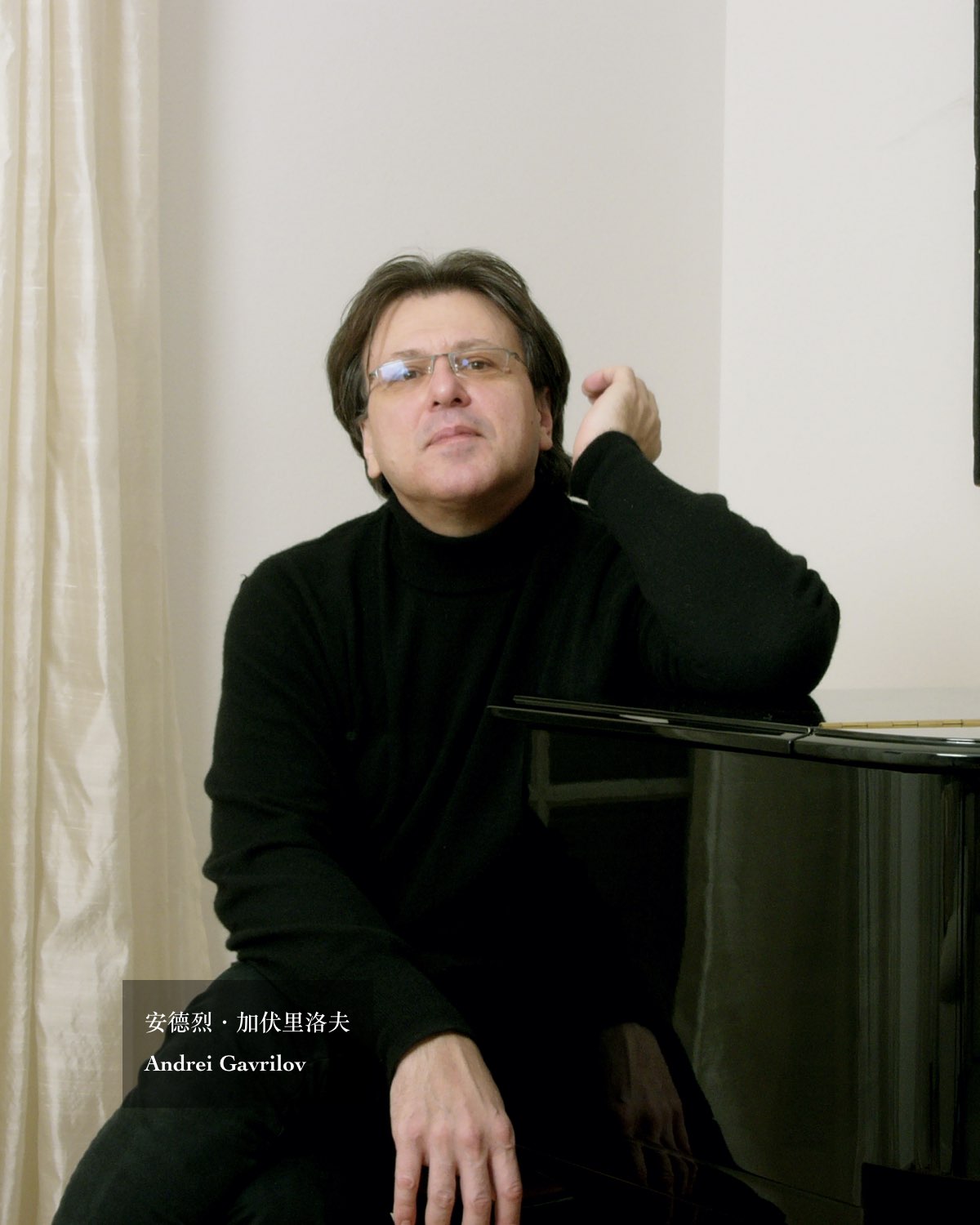

加伏里洛夫生於 1955 年莫斯科的藝術家庭中。他的父親衛拉第邁.加伏里洛夫是個優秀的畫家,母親則是涅高茲(Henrich Neuhaus)的學生,同時也是他的第一位鋼琴老師。加伏里洛夫 1973 年從莫斯科中央音樂學校畢業,並曾在那裡和凱斯特納(Tatiana Kestner)學習;同一年又進入莫斯科音樂院,師從瑙莫夫(Lev Naumov)。
加伏里洛夫贏得的第一個獎項是 1974 年的國際柴可夫斯基大賽,當時的他年僅 18 歲;同年在薩爾茲堡音樂節首次登場,作為李希特的替補人而揚名世界舞台。隨後又和許多世界級管弦樂團演出,享譽國際。
1976 年,加伏里洛夫首次在倫敦的皇家慶典廳(Royal Festival Hall)與貝格隆 (Paavo Berglund)和柏恩茅斯交響樂團(Bournemouth Symphony Orchestra)合作演出,1978 年又與柏林愛樂在歐洲的幾個主要音樂廳合演了 30 場音樂會。得獎後加伏里洛夫成為媒體新寵兒,在前往歐洲演出之際發表不少反動言論,直至 1979 年卡拉揚邀請他與柏林愛樂一起灌錄唱片,排練當天加伏里洛夫正準備出發至柏林,護照卻被前蘇聯 KGB 給沒收而未能成行,連帶 1980 年巡迴美國的 52 場演出也被迫找來好幾位鋼琴家代打,其中包括波哥雷利奇。
加伏里洛夫被 KGB 囚禁的五年之中不准與他人接觸,三次遭到 KBG 暗殺未遂加上完全的孤獨,使得他精神錯亂,焦慮產生的換氣過度(hyperventilation)更使得他幾乎無法自主行動。直至 1984 年,加伏里洛夫在蘇聯領導人戈巴契夫(Mikhail Gorbachev)的幫助下再度前往倫敦演出,成為第一個可以自由進出蘇聯而不用申請政治庇護的蘇聯藝術家。1985 年加伏里洛夫首度在紐約卡內基音樂廳演出,為美國樂壇掀起一股大風暴,他的演出風格之特異,還在《紐約時報》引起了前所未有的辯論,而紐約時報首席樂評何納罕(Donal Henahan)則認為加伏里洛夫是當時最重要的藝術家之一。
在 1976 至 1990 年間,加伏里洛夫成為 EMI 獨家的藝術家,贏得了包含 1979 年的留聲機雜誌獎、1981 年的德國唱片大獎(Deutscher Schallplattenpreis)、1985 與 1986 年的唱片大獎與查理.柯羅斯學院獎(Grand Prix International du Disque de L'Academie Charles Crois)以及 1985 年的國際唱片評論家獎(International Record Critics Award, IRCA)等諸多國際獎項。其他獎項還包含1989年最高國際學院音樂獎(Premio Internazionale Accademia Musicale Chigiana,評審委員宣布他是世界上最偉大的鋼琴家)、美國名人錄(American Biographical Institute, ABI)國際研究委員會的年度風雲人物 (Man of the Year) 紀念獎章、金唱片獎(Gold Record of Achievement)和終生成就獎(World Lifetime Achievement awards),認同他對社會的貢獻。這些獎項讓他成為當代最重要的鋼琴家之一,但他不汲汲於名利,積極參與慈善音樂會,例如在英國巴比肯音樂廳舉辦的 1988 年亞美尼亞大地震慈善音樂會,邀請羅斯托波維契等人參與,將所得的 50 萬英磅全數捐給亞美尼亞受災難民。他後來又與紐約、洛杉磯、底特律、克里夫蘭、芝加哥、費城、蒙特利、多倫多、倫敦、維也納、巴黎、柏林、慕尼黑、阿姆斯特丹、東京、莫斯科、聖彼得堡等,還有其他許多主要樂團,以及指揮家阿巴多、海汀克、慕提、小澤征爾、史維特拉諾夫、鄧許泰特、拉圖和馬利納和其他許多著名指揮家合作演出。
1990 年 10 月,加伏里洛夫和德國留聲機公司(Deutsche Gramophone, DG)簽訂獨家合約,錄製了廣受歡迎的蕭邦、普羅高菲夫、舒伯特、巴赫和葛利格等音樂家作品。然而在事業到達最高峰的 1993 年,加伏里洛夫突然意識到他的物質生活相當充裕,但精神生活並沒有達到他想要的自由,而是被鋼琴演出事業綁得死死的,喘不過氣來,因此他選擇退隱。「如往常的某天早上,我吃完早餐,做一些體能訓練,晚上在巴塞爾還有一場音樂會等著我,但忽然一個念頭閃過腦中:『我不想彈了!』不知道為什麼這個念頭像旋渦一樣擴大,並幾乎將我吞噬,我忽然不知道為什麼要繼續彈?我馬上取消了當天的音樂會,緊接著是所有音樂會,還有與 DG 的唱片合約。」
不過加伏里洛夫並沒有放棄音樂,這段時間他持續研讀宗教與哲學議題,再揣摩作曲家對作品的意圖,並且精練琴藝,尋思一個嶄新的音樂世界觀,他為此甚至到斐濟住了半年!「某次在飛機上,忽然像是與異世界接軌般,看到一道白色的柱體,忽然間,這十幾年來所有的問題,所有的掙扎與拉扯,就像被洗滌並清理了!之後我又回去研究柴科夫斯基的第一號鋼琴協奏曲,忽然明白且接收了作品當中作曲家所隱含的密碼。」2001 年,加伏里洛夫凱旋式的回到俄國,並在莫斯科音樂院一晚演奏了四首鋼琴協奏曲,正式重返樂壇。自此之後,他開始更加常態的在世界各地演出,並獲得前所未有的成功。2008 年他為了音樂會而回到美國,2009 年他成功的作了世界巡演,還包含長達四個月之久俄羅斯全境巡迴。14 年後的 2010 年 2 月,加伏里洛夫受維也納愛樂之邀,到黃金大廳開了一系列四場音樂會。
Andrei Gavrilov was born in Moscow in 1955 in the artistic family. His father Vladimir Gavrilov was a great painter, mother pupil of Henrich Neuhaus was his first teacher. He graduated central music school in Moscow in 1973 where he studied with Tatiana Kestner. Later this year he entered Moscow conservatory where his teacher was Lev Naumov.
Andrei Gavrilov won first prize in the 1974 International Tchaikovsky Competition at the age of 18 and in the same year made a triumphant international debut at the Salzburg Festival, substituting for Sviatoslav Richter. He has subsequently enjoyed a distinguished international career which has included performances with many of the world's greatest orchestras.
He made his London debut in 1976 with Paavo Berglund and the Bournemouth Symphony Orchestra in the Royal Festival Hall. In 1978 he performed with the Berlin Philharmonic in a major European concert tour of 30 concerts. By 1980 he had performed in all the major cultural centers in the world.
Andrei Gavrilov made a triumphant return to the British concert platform in 1984, after a politically enforced absence, giving recitals at the Barbican and the Royal Festival Hall. He successfully petitioned Mikhail Gorbachev for his freedom, and became the first Soviet artist to be granted permission to stay in the West without having to file for political asylum. Following his Carnegie Hall debut in 1985, Andrei Gavrilov was proclaimed as a major artist by the New York Times' Donal Henahan. He has since performed with orchestras in New York, Los Angeles, Detroit, Cleveland, Chicago, Philadelphia, Montreal, Toronto, London, Vienna, Paris, Berlin, Munich, Amsterdam, Tokyo, Moscow, St-Petersburg and many other major orchestras with conductors including Abbado, Haitink, Muti, Ozawa, Svetlanov, Tennstedt, Rattle and Neville Mariner among numerous others.
Between 1976 and 1990, Andrei Gavrilov was an exclusive artist with EMI, winning several international prizes including a Gramophone award in 1979, Deutscher Schallplattenpreis in 1981, Grand Prix International du Disque de L'Academie Charles Crois in 1985 and 1986, and International Record Critics Award (IRCA) in 1985. Among his other awards are the 1989 Premio Internazionale Accademia Musicale Chigiana (the jury of music critics proclaiming him as the greatest pianist in the world), and the Board of International Research of American Biographical Institute (ABI) Man of the Year commemorative medal, Gold Record of Achievement and World Lifetime Achievement awards, in recognition of his contribution to society. In 1998 Andrei Gavrilov was selected as one of the pianists to be featured in Philips Music Group's Great Pianists of the Twentieth Century collection.
In October 1990 Andrei Gavrilov signed an exclusive contract with Deutsche Gramophone, leading to acclaimed recordings of Chopin, Prokofiev, Schubert, Bach and Grieg. From 1994 until the year 2001 Andrei Gavrilov made a 7 years pause and almost did not played open concerts. He studied philosophy and religion and was searching for new ideas and his new approach to music.
In 2001 he made his triumphant comeback to Russia after 16 years playing 4 piano concertos in one evening in the Moscow Conservatory. Since that time he begins to play more and more regular around the world with greater success as ever. In 2008 he comes back for concert in the United States. In 2009 he made a world tour which included four months long all Russian tour with enormous success. In February 2010 he was invited to the Vienna Philharmonic Golden Hall to play 4 concerts in a row after 14 years long pause.
頁面最後更新:2020/02/07